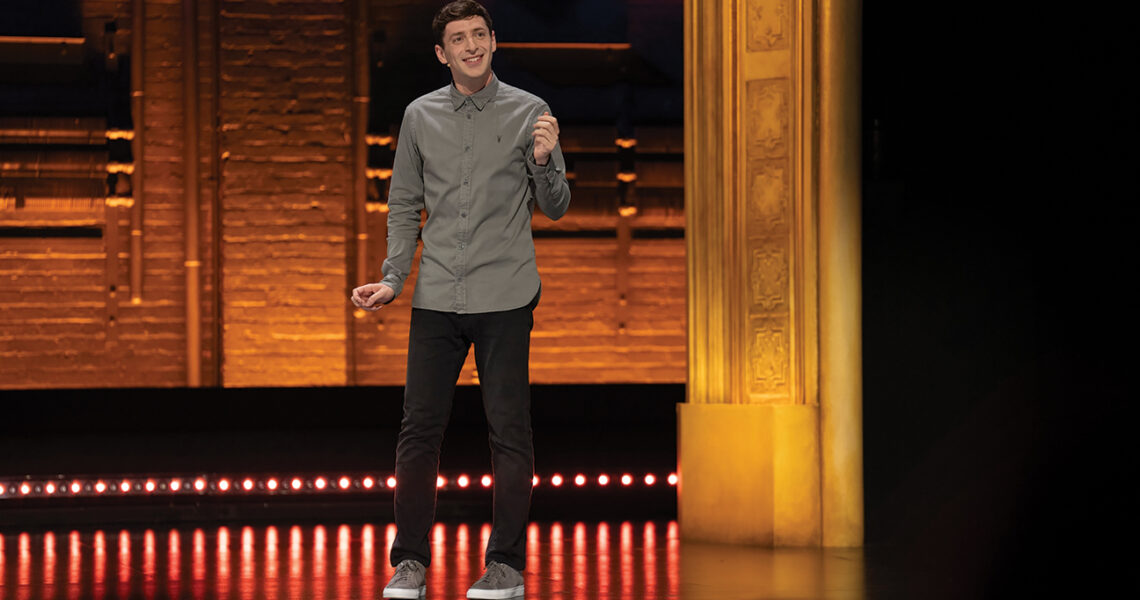Alex Edelman Shares Insights on ‘Just For Us’ Special
Until this year, I worried about Just for Us‘ timeliness.
Just for Us, if you haven’t seen it, is a comedy show about a Jew — me — who attends a meeting of white nationalists in Queens. Eventually, they cotton on. The show has had a long and blessed life, having wound its way through the anglophone comedy world, finding a nice home on Broadway last summer before alighting on Max this April. However, in its 2018 infancy, I was only a few months removed from the gathering it was based on, and was trawling it through British and Australian comedy venues. Small theaters, pubs above a shoe store, anywhere that would have me.
And coupled with the praise (faint!) was the word “timely.”
Remember 2018? Those Thai kids had to be rescued from that cave and Meghan and Harry got married. There was also the recency of Charlottesville and the Tree of Life shooting, so “timely” kind of made sense. Pretty evergreen topic, though. A comedy show even tangentially related to antisemitism would be topical in 2018, but also, say, the 1960s. Or the 1940s. Or the 1490s. Whenever anyone offered the word “timely” as a descriptor or a post-show compliment, I kind of had to keep myself from rolling my eyes.
But when the show went up in the United States for the first time, different story. It was December of 2021. I had frittered away a good part of 2019 writing on a blink-and-you-missed-it Netflix show, and the 18 months before our opening in New York had been spent sheltering in place, familiarizing myself with sourdough starter. By then? Timeliness was a concern.
“What if it’s a time capsule? What if the attitude feels dated?” I asked my director, Adam Brace, two days before our first preview. In the show — as in the real-life event it was based on — I didn’t do a ton of fighting with the white nationalists: I figured that I stood very little chance of winning them over, and also, I was curious and a bit scared. So I had mostly listened. I worried that, in a world where the political atmosphere seemed much more charged, a comedy show depicting someone quietly eating a muffin in the presence of truly regressive, prejudiced opinions might seem quaint (at best!) or offensive (worst!).
“I think it’ll be all right,” said Adam, who was sipping a beer. We both were, to be fair. “Everyone finds themselves now in rooms with people who think their opinions are offensive. Sometimes those people are their relatives.” He was right, and in the conversations we had with audiences — what they responded to during the show and in nightly lobby conversations afterward — we figured out something interesting. People were interested in the stuff we talk about around our proverbial water cooler (still Twitter, somehow) but they were more interested in how we talk to each other. The “timely” compliment got replaced with “empathetic.” At one of our last live shows in March, someone asked me how she could talk to her friend when they had such a terrible opinion on Israel and Palestine. Which would have made me sad even if the person asking hadn’t been 13 years old.
The last bit of Just for Us asks the question about what our empathies should extend to. I started asking aloud onstage in 2018, but it had never really felt prominent in the show. Now, it was the center of practically every post-show conversation. If you watch the special — spoiler! — you’ll see I never figured on a firm solution, but I guess the vacillation is the point. It’s so easy to slip into binaries. There are two types of people: those who insist on binaries and those who don’t. And everyone who insists on binaries should be — oh, wait, see? Dangerous.
The discursive environment we’re in now feels like an episode of that YouTube show where celebrities eat hot wings and try not to vomit, but there’s got to be a way to navigate what will surely be a hellish election season without tearing each other apart. In these culture war skirmishes where we become convinced of our moral superiority, we might win some insipid argument around boxers at the Olympics, speeches at the Oscars, the skin color of The Little Mermaid, but we risk something much more important: our ability to understand each other.
Also, the moral high ground. You’re going to want the moral high ground.
This story first appeared in an August stand-alone issue of The Hollywood Reporter magazine. To receive the magazine, click here to subscribe.

